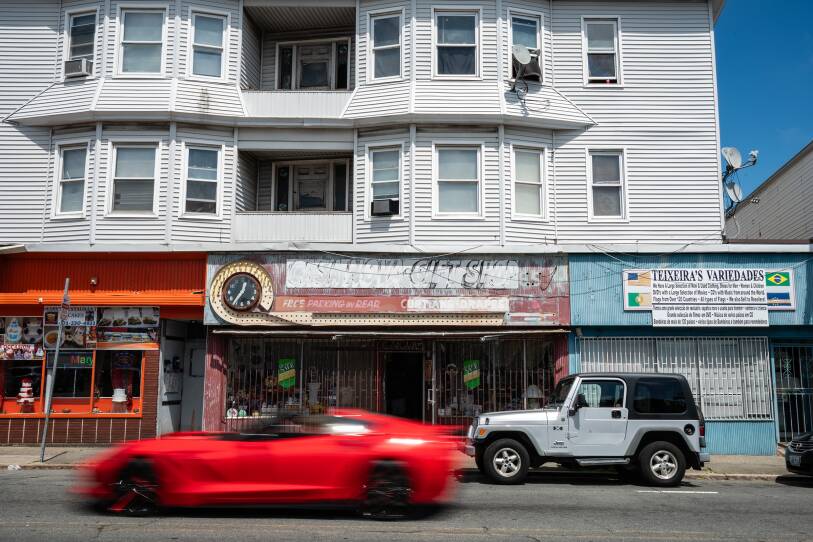Haga clic aquí para leer esta historia en español.
In the summer of 2022, Rodrigo had a decision to make: The then 17-year-old could go back to New Bedford High School for 11th grade or keep working to send money to his family in El Salvador.
Rodrigo had spent most of the school year going to class during the day, and working a 9- or 10-hour shift at night at a New Bedford seafood processing plant, rarely getting more than a few hours of sleep.
The schedule was grueling, and Rodrigo was exhausted, but his older brother urged him to stay in school and learn English.
“I don’t know,” he said in Spanish. “I don’t know, because my brother tells me to continue studying during the day, but for me it’s difficult.”
The Public’s Radio agreed not to use Rodrigo’s full name or identify his family members and his former employer to protect his identity. To verify his story, reporters reviewed an affidavit submitted to Probate and Family Court that provided many details of his life before and after he arrived in the U.S.
Rodrigo is among the more than 250,000 migrant children who have entered the United States alone during the 2021 and 2022 fiscal years, an unprecedentedsurge. Most of the unaccompanied minors are from Central America.
The Public’s Radio interviewed more than two dozen migrant teens who said they worked in New Bedford seafood processing plants as far back as 2016. With the support of the PBS series FRONTLINE, reporters reviewed over 2,000 pages of documents and spoke to more than 100 sources as part of a two-year investigation.
The U.S. Department of Labor is investigating three New Bedford businesses for possible violations of child labor, overtime pay, and anti-retaliation laws, according to documents obtained by The Public’s Radio. The department declined to comment.
Migrant teens said they had to work to pay debts to smugglers, send money home to their families, or support themselves. Many described spending their days in class and their nights standing for hours on cold plant floors, cleaning, fileting, and packaging seafood – an ultimately untenable balancing act.
“You feel tired,” Rodrigo said. “Too tired.”
An hour to sleep
Rodrigo often wears gold earrings and a backwards baseball cap over his dark, curly hair. He’s polite, cheerful, and devoted to his family.
He came to the United States as an unaccompanied minor in 2021. He says he left his home in El Salvador to escape gang violence and find work.
Rodrigo was 16 when he arrived in New Bedford, where one in five residents was born overseas. The town’s thriving Central American community fills churches and restaurants. Hundreds attend the annual Guatemalan festival, a celebration that features indigenous music, food, and traditional, brightly embroidered clothing.

Rodrigo moved in with his older brother, who covered his rent and utility bills and helped him find an immigration attorney. Rodrigo’s brother also took Rodrigo to the first restaurant meal of his life.
“He’s everything to me,” Rodrigo said. “He’s like my father.”
But Rodrigo owed a smuggler $5,000, which he said was secured in his father’s name in El Salvador.
Another family member helped him find a job working the overnight shift at a New Bedford seafood processing plant. Rodrigo said the processor hired him directly – and didn’t require him to provide any identification.
On a rainy Sunday in April, Rodrigo and a reporter for The Public’s Radio sat in a car outside the processing plant where Rodrigo said he worked. He pointed to the door that led to the freezers that he’d cleaned. He recoiled from the strong, familiar odor of seafood emanating from the plant.

Rodrigo said his shift began at 5 pm and some days lasted until 6 am.
When he came home from work, all he wanted to do was sleep, but he forced himself to shower to scrub off the smell of fish that clung to his body. The odor was so strong that he had to wash his work clothes every day.
The job was hard on his body. Each shift, Rodrigo stood for at least eight hours straight. He sometimes cleaned freezers that were so cold his hands would go numb even through gloves.
He shoveled what he called fish waste into a machine that ground it up into bits, he said, then another machine pressed it into blocks that weighed about 50 pounds.
He would then stack the blocks 10 rows high on top of pallets. The plant typically supplied companies that make products sold in grocery stores nationwide.
“You feel like lying down and sleeping for two days and then going back to work,” he said.

Federal law prohibits minors from operating some power-driven machinery. Massachusetts Law bars 16- and 17-year-olds from working shifts longer than nine hours, and from working after 10 pm on school nights.
A few weeks after he began working at the plant, Rodrigo enrolled at New Bedford High School, one of the largest secondary schools in the Commonwealth, with nearly 3,000 students.
On his first day of school, Rodrigo went to the main office to pick up his class schedule, but couldn’t figure out how to find his classrooms.

In 2022, nearly half of the school’s students were Hispanic, according to data from the Massachusetts Department of Elementary and Secondary Education. About 80% were considered low-income.
During periods between classes, the hallways filled with the din of students speaking in — and some yelling in — languages including Spanish, Portuguese, and Cape Verdean Creole.
Rodrigo asked to leave work at midnight, but his boss refused. He began leaving work early — at 2 or 3 am. Some nights, he said, he only had an hour to sleep between getting home from work and getting up for school.
For six months, he barely managed to juggle his often 21-hour days. He often fell asleep in class, resting his head on his desk, with his hoodie pulled over his eyes.
Rodrigo was passing some classes and failing others. He didn’t have enough time to finish his homework, let alone study for exams.

One day, he said, his Algebra teacher handed him an exam that was written in English. But Rodrigo could only read in Spanish.
“I just put my name and gave it back blank, because I didn’t know what to do,” he said. “I didn’t understand.”
He left New Bedford High in May of 2022.
Struggles and strategies
Teachers and guidance counselors at New Bedford High said they learned to recognize the signs a student worked in seafood processing. Teens sometimes smelled of fish and struggled to stay awake. Some skipped days, or stopped attending classes entirely, to work.
“Our mission is to keep students connected to school,” said Andrew O’Leary, interim superintendent of New Bedford Public Schools. “I wouldn’t dispute that students who are in employment, and have employment pressures, have difficulty connecting to school, and absolutely that would be linked with the dropout rate.”
Many foreign-born teens, like Rodrigo, cannot speak, read, or understand English well when they enroll at New Bedford High. Such teens, who the state considers English-language learners, represent 28% of the school’s student body, but they aremore likely to drop out than their classmates, according to data from the state education department.
There are “too many factors that could influence our kids to just give up,” according to Dr. Sonia Walmsley, Executive Director of Educational Access and Pathways for New Bedford Public Schools. “Can you imagine coming in the middle of the year from a different country?”
Walmsley said that state law prohibits translators in classrooms. Teachers are allowed to translate instructions, such as “open the book and go to question one,” but not content, like, What is 5 x 2?
Walmsley said the school teaches many classes in English, including math and science, because it’s not possible for a teacher to translate lessons into all of the languages students speak. On its website, the school provides information in six languages.
There are “too many factors that could influence our kids to just give up.”Sonia Walmsley, Executive Director of Educational Access and Pathways for New Bedford Public Schools
A two-year U.S. Department of Justice investigation found that New Bedford’s schools were not doing enough to make sure those students had the same educational opportunities as their peers, according to a 2022 settlement agreement. The district agreed to provide more services to children who speak K’iche’, a Mayan language spoken by many students from Guatemala and their families.
This year, the district will focus on getting families of students who are learning English more involved in school activities, in addition to providing more multilingual staff that are trained to work with those children, according to O’Leary.
Time to decide
After he left school, Rodrigo tried to switch to the day shift at the seafood processing plant, but said his request was denied. A month later, he quit. He had managed to pay off his debt, but couldn’t keep working at the plant. He was exhausted.
Rodrigo began helping his brother on construction projects, laying concrete. He earned around $600 a week, he said, about the same as he did at the processing plant. But his workdays ended around 5 pm, not 5 am, allowing him to spend time with friends.
Throughout the summer of 2022, Rodrigo debated whether to return to school. He knew learning English would help him get easier, better-paying jobs. He thought about taking classes at the district’s night school.
“I have a little bit of time [to decide],” he said.
Rodrigo said one of the “gringos” he worked with was helping him learn English. “He told me it’s like I’m in school because he is teaching me words every day,” he said.
Ondine Galvez Sniffin, Rodrigo’s immigration attorney, said many of her clients are forced to choose between working full-time and finishing high school. While she encourages her clients to stay in school, Sniffin said many of her clients, especially those who are 16 and 17 years old, are facing financial pressures.
“So I say, ‘look into [night school] before you leave the school because once you leave the school, it’s going to be a lot harder to go back,’” Sniffin said. “I always tell them that and hope for the best.”
More than a year later, Rodrigo hasn’t gone back to school. He says he might sign up for English classes next year.
His immigration case is proceeding, which could help him get a work permit and the legal protections that come with it. Meanwhile, he continues to work with his brother part-time. He is 18 now, but he hasn’t been able to find another full-time job.
“I had an idea that things were going to be different,” Rodrigo said. “I thought it was going to be easier. But it is not.”
This story is part of a collaboration between The Public’s Radio and FRONTLINE’s Local Journalism Initiative, which is funded by the John S. and James L. Knight Foundation and the Corporation for Public Broadcasting. Click here for more stories from the series Underage and Unprotected.







